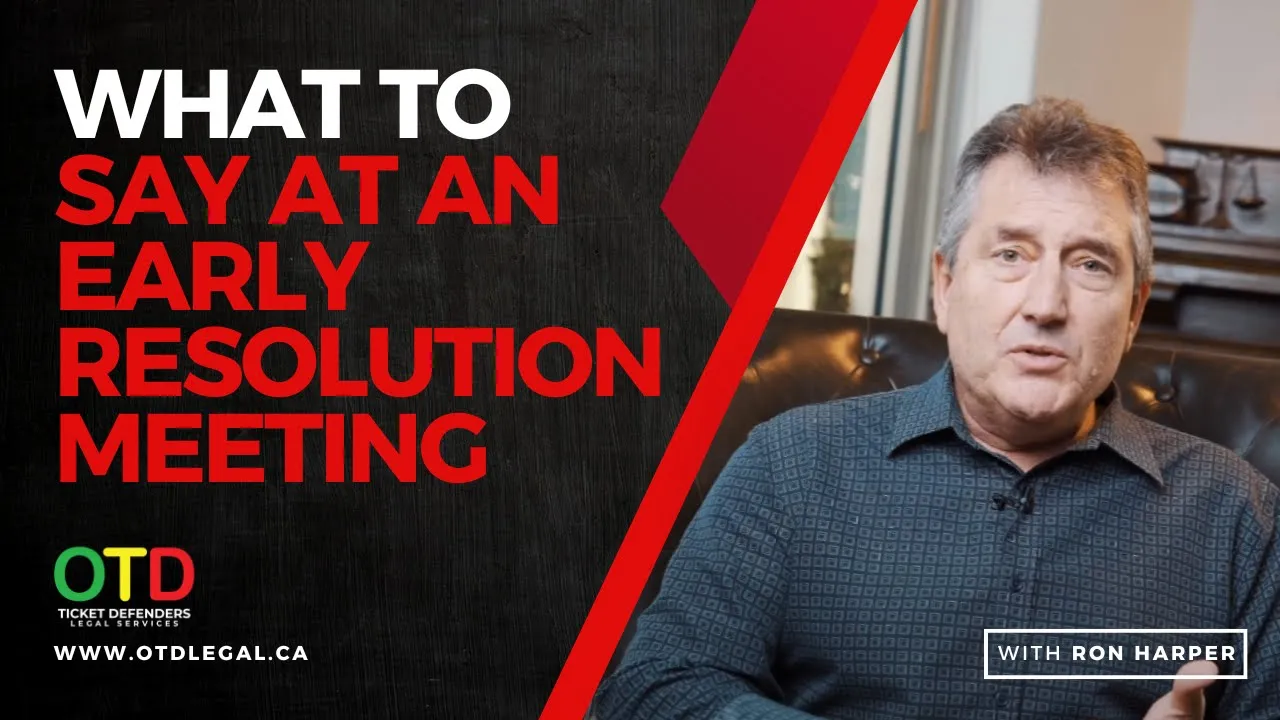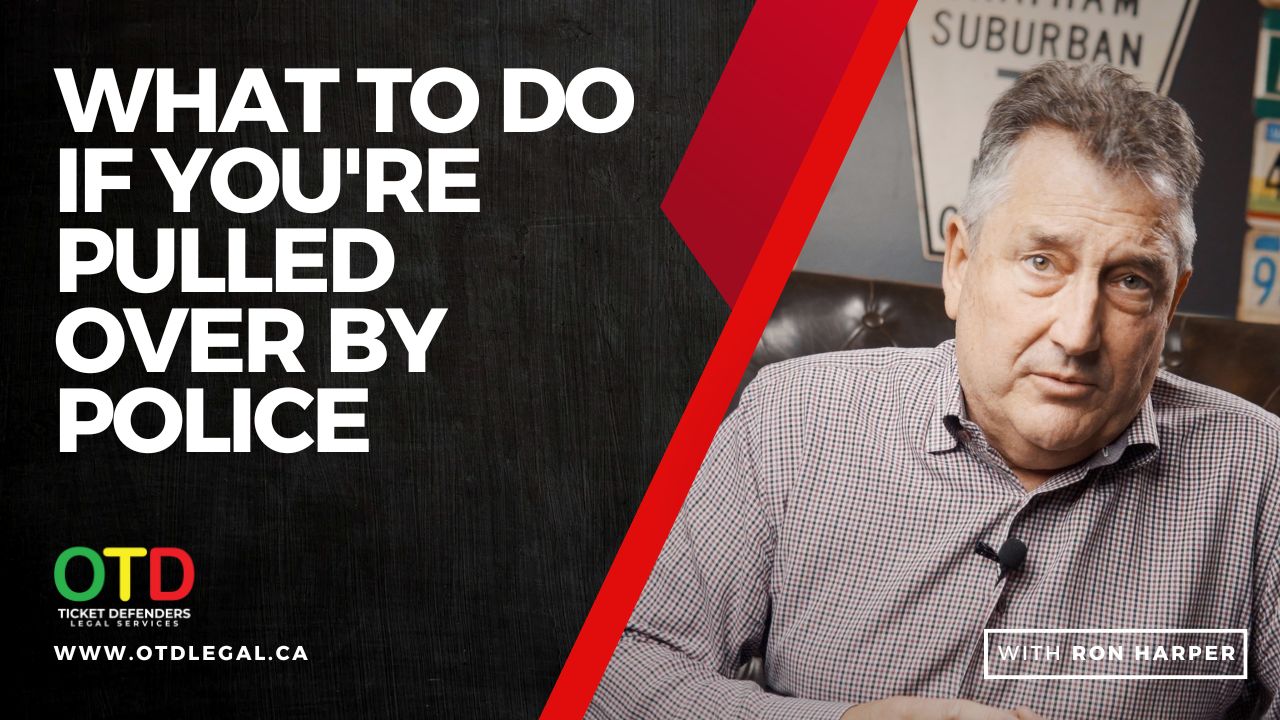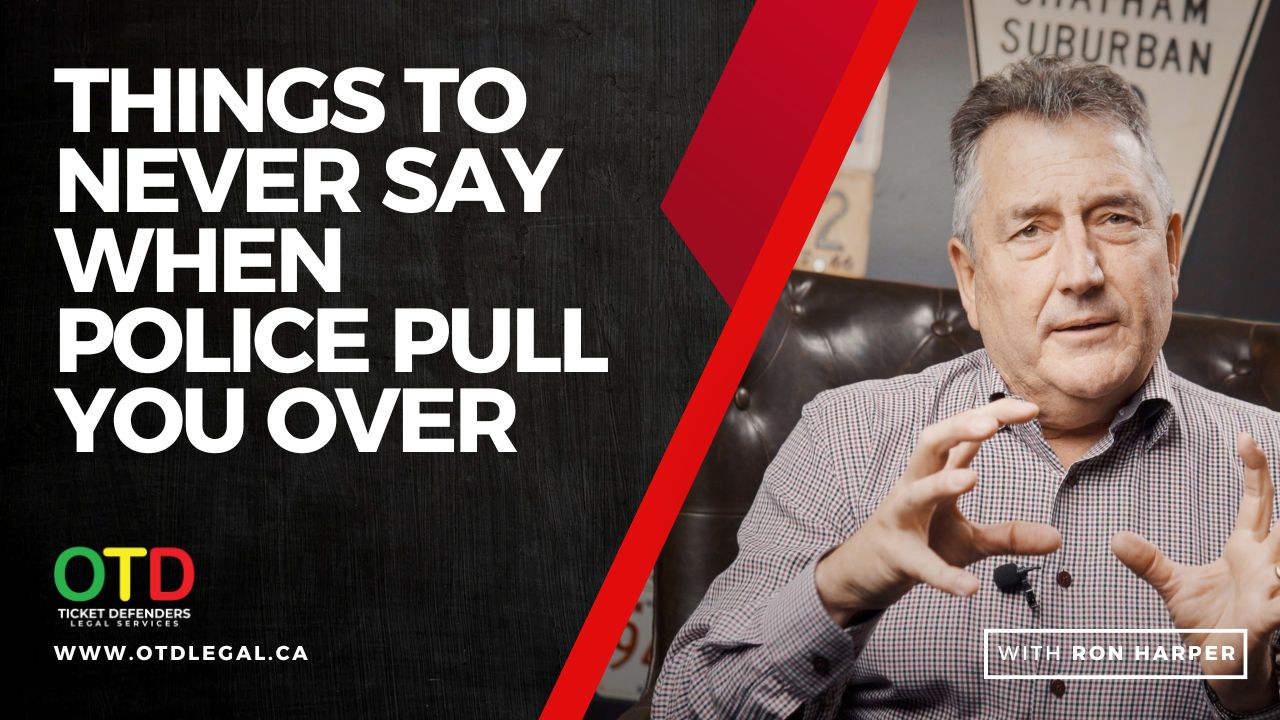Not every traffic stop by police is lawful – knowing your rights can make all the difference.
- A traffic stop becomes an unlawful detention if police don’t have proper grounds, go beyond the original reason for the stop, or prolong it unreasonably.
- In Ontario, police can stop drivers under the Highway Traffic Act – but they can’t use this as an excuse to search or interrogate without cause.
- You have the right to know why you’re being stopped, to remain silent beyond providing your licence, registration, and insurance, and to speak to a lawyer if you’re being detained.
- If police overstep, any evidence they collect – like statements or searches – could be excluded from court, weakening the case against you.
- Understanding these legal boundaries not only helps you assert your rights but also builds a stronger defence if you’re charged.
Bottom line: A traffic stop doesn’t give police unlimited power – knowing where the line is can protect you from unlawful detention.
Keep reading to learn when a routine stop crosses the line and what to do if it does.
Being pulled over by police is stressful enough without wondering whether the officer is exceeding their legal authority. While Ontario police have significant powers to conduct traffic stops under the Highway Traffic Act, these powers aren’t unlimited. Understanding when a routine traffic stop crosses the line into unlawful detention can be crucial for protecting your rights and potentially defending against any charges that result.
The distinction between a lawful stop and unlawful detention isn’t always obvious, but it can make the difference between a valid conviction and having evidence thrown out of court. Let’s explore the legal boundaries that govern traffic stops in Ontario and what happens when police step outside those boundaries.
What Is a Lawful Traffic Stop in Ontario?
Ontario police operate under the Highway Traffic Act (HTA), which grants them broad authority to stop vehicles for various purposes. Understanding these legitimate reasons helps you recognize when a stop might be crossing into unlawful territory.
The Police Have the Right to Stop You – But Within Limits
Police officers in Ontario have extensive but not unlimited powers to conduct traffic stops. The Highway Traffic Act specifically authorizes officers to stop vehicles for several legitimate purposes:
Document verification: Officers can stop any vehicle to check your driver’s licence, vehicle registration, and proof of insurance. This doesn’t require any suspicion of wrongdoing – it’s a preventive measure built into Ontario law.
Sobriety testing: Police can pull over any driver to assess whether they’re impaired by alcohol or drugs. This includes random stops and organized RIDE programs, which the Supreme Court of Canada has upheld as constitutional despite being “arbitrary detention.”
Mechanical fitness: Officers can stop vehicles to inspect their mechanical condition and ensure they meet safety standards for road use.
Suspected violations: Police can stop drivers when they observe or suspect violations of the Highway Traffic Act, such as speeding, running red lights, or careless driving.
Criminal investigation: If police have reasonable grounds to suspect you’re involved in criminal activity, they can stop and detain you for investigation.
The key point is that while these stops may technically constitute “arbitrary detention” under the Charter, the Supreme Court has ruled they’re justified as necessary for public safety.
Common Reasons for Being Pulled Over
Most traffic stops fall into predictable categories, and knowing what to expect can help you navigate the interaction properly:
Observed violations: The most common reason for stops is when officers witness traffic violations. This could be speeding, failing to signal, running stop signs, or other moving violations.
Equipment violations: Defective lights, expired licence plates, or obviously unsafe vehicles often trigger stops.
Random checks: RIDE programs and random document checks are completely legal in Ontario, even without any suspicion of wrongdoing.
Suspicious behaviour: If your driving pattern suggests impairment or other problems, police can stop you to investigate.
BOLO alerts: Police might stop vehicles matching descriptions from “Be On the Lookout” alerts for stolen cars or wanted suspects.
The legitimacy of the initial stop doesn’t automatically make everything that follows legal – that’s where things can get complicated.
Understanding Detention During a Traffic Stop
The legal concept of “detention” is more complex than simply being stopped by police. Understanding when detention occurs and what rights it triggers is crucial for recognizing unlawful police conduct.
What Counts as “Detention”?
Under Canadian law, detention occurs when police, through physical or psychological restraint, prevent you from leaving. It’s not just about physical restraint – if a reasonable person in your situation would conclude they have no choice but to comply with police demands, you’re detained.
Clear detention scenarios:
- Being told you’re not free to leave
- Police blocking your vehicle or positioning themselves to prevent departure
- Being handcuffed or physically restrained
- Officers drawing weapons or making threats
Psychological detention indicators:
- Demanding documents in an authoritative manner
- Multiple officers approaching your vehicle
- Activating emergency lights and sirens
- Language or behaviour that suggests you must comply
Not considered detention:
- Casual conversations or requests for information
- Brief interactions where you’re clearly free to leave
- Asking for directions or general inquiries
The moment detention begins, specific Charter rights are triggered, including the right to know why you’re detained and the right to speak with a lawyer.
How Long Can They Keep You at the Roadside?
The duration of a traffic stop must be reasonable and related to its original purpose. A stop that begins lawfully can become unlawful if it’s prolonged beyond what’s necessary.
Reasonable duration factors:
- Document processing time: Checking your licence and running it through police databases
- Ticket writing: Completing necessary paperwork for violations
- Safety considerations: Waiting for safe conditions to release you
- Investigation needs: Time required to assess suspected impairment or other issues
Signs of unreasonable prolonging:
- Holding you while investigating unrelated matters
- Waiting for drug dogs or other specialized units without grounds
- Extensive questioning about matters unrelated to the stop
- Delaying paperwork to extend the interaction
The “scope creep” problem: A stop for speeding shouldn’t turn into an extended investigation of your personal life, travel plans, or vehicle contents without additional grounds developing during the stop.
If police develop new suspicions during a legitimate stop, they can extend the detention – but they must inform you of the new reasons and your rights.
When a Traffic Stop Crosses the Line
Even stops that begin lawfully can become unlawful if police exceed their authority or violate your Charter rights. Recognizing these violations is essential for protecting yourself and potentially excluding evidence in court.
Unreasonable Delays or Prolonged Questioning
A lawful stop can become unlawful if police prolong the detention beyond what’s reasonably necessary for the original purpose.
Red flags for unlawful prolonging:
- Fishing expeditions: Asking numerous questions unrelated to the reason for the stop
- Waiting for backup: Calling additional officers without justification
- Extensive database searches: Running checks beyond normal licence and registration verification
- Repeat questioning: Asking the same questions multiple times or continuing after you’ve asserted your right to silence
Example scenario: You’re stopped for speeding, but instead of writing the ticket, the officer spends 30 minutes asking about your travel plans, searching databases for unrelated matters, and calling for a drug dog. This transformation of a simple traffic stop into an extended investigation likely crosses into unlawful detention territory.
The “pretext stop” problem: Police cannot use legitimate HTA violations as pretexts for broader criminal investigations. If the real purpose is to investigate unrelated criminal activity, the stop becomes unlawful regardless of the technical HTA justification.
Searches Without Cause or Consent
When searches become unlawful:
- No consent given: You have the right to refuse vehicle or personal searches
- No grounds for search: Searching without reasonable belief that you possess evidence of a crime
- Exceeding arrest powers: Searching beyond what’s justified by the reason for arrest
- Fishing expeditions: Looking through your vehicle hoping to find something incriminating
Limited search powers during detention: If you’re detained but not arrested, police can only conduct limited searches:
- Pat-down for weapons if they have safety concerns
- Plain view observations of the vehicle interior
- Searches with your explicit consent
Broader search powers after arrest: If you’re arrested, police have expanded search powers for:
- Officer and public safety
- Preventing destruction of evidence
- Locating evidence related to the arrest
Demands That Go Beyond the Purpose of the Stop
Police authority during traffic stops is limited to the legitimate purpose of the stop. Expanding beyond that purpose without additional justification can make the detention unlawful.
Legitimate demands during HTA stops:
- Driver’s licence, registration, and insurance
- Questions directly related to the suspected violation
- Sobriety assessment
- Exit the vehicle if officer safety is a concern
Potentially unlawful demands:
- Questions about personal life unrelated to driving
- Demands to search vehicle or belongings
- Requiring passengers to provide identification without grounds
- Questioning about travel plans, occupation, or relationships
- Demanding access to your phone or electronic devices
The expansion rule: If police want to expand the scope of the stop, they must:
- Inform you of the new reason for detention
- Have legitimate grounds for the expansion
- Advise you of your Charter rights if the situation has changed significantly
Your Rights During a Traffic Stop
Understanding your rights helps you protect yourself and creates a record for potential court challenges if police exceed their authority.
Do You Have to Answer Questions?
Your right to remain silent is protected under Section 7 of the Charter, but the extent of this right during traffic stops has some nuances.
What you must provide:
- Driver’s licence
- Vehicle registration
- Proof of insurance
- Basic identification information
What you don’t have to discuss:
- Where you’re going or coming from
- What you’ve been doing
- Who you’re with or travelling to see
- Details about your personal life
- Explanations beyond what documents show
Important caveats:
- You cannot lie to police – that’s a separate offence
- You can simply say “I prefer to remain silent” or “I’d like to speak with a lawyer”
- Refusing to answer questions may prolong the stop, but it’s your legal right
Practical advice: Be polite but firm in asserting your rights. Arguing or being confrontational rarely helps your situation and can escalate the encounter.
Can You Refuse a Search?
Yes, you have the right to refuse consent to vehicle or personal searches, and exercising this right cannot be used as evidence against you.
How to refuse consent:
- Clearly state: “I do not consent to any searches”
- Don’t physically resist if police proceed anyway
- Ask to speak with a lawyer before making decisions
- Make mental notes of what occurs for later court testimony
What refusing consent means:
- Police must rely on other legal justifications to search
- They may try to find grounds or wait for search warrants
- Your refusal cannot be used to justify the search
- The detention may be prolonged while police determine their options
Important distinction: Refusing consent doesn’t stop police from searching if they have other legal grounds – it just means they can’t rely on your permission to justify the search.
What to Do If You Feel Your Rights Are Violated
If you believe police are exceeding their authority during a traffic stop, your immediate priorities are staying safe and preserving evidence for later court challenges.
During the stop:
- Remain calm and avoid confrontation
- Clearly assert your rights: “I want to speak with a lawyer”
- Don’t consent to searches or extended questioning
- Make mental notes of what officers say and do
- Ask for badge numbers and names if possible
Document everything afterward:
- Write down exactly what happened while it’s fresh in your memory
- Note the time, location, and weather conditions
- Identify any witnesses who observed the stop
- Take photos of the stop location if safe to do so
- Keep all tickets and paperwork given to you
Don’t handle it alone: Charter challenges require specific legal procedures and expertise that most people don’t possess.
Challenging an Unlawful Detention in Traffic Court
If your rights were violated during a traffic stop, you may be able to use this to defend against any charges. However, successfully challenging unlawful detention requires understanding both the legal standards and court procedures.
How It Can Impact Your Case
Charter violations during traffic stops can have several impacts on your case, depending on the severity of the breach and the evidence obtained.
Potential outcomes of successful Charter challenges:
- Evidence exclusion: Crucial evidence against you might be thrown out
- Charge withdrawal: Prosecutors might drop charges rather than proceed without key evidence
- Reduced charges: Weak cases often result in negotiated plea deals
- Complete dismissal: Serious Charter breaches can lead to stays of proceedings
Types of evidence that might be excluded:
- Observations made during an unlawful detention
- Results of breathalyzer or field sobriety tests
- Evidence found during unlawful searches
- Statements you made while your rights were violated
- Physical evidence discovered as a result of Charter breaches
The reality check: Not every Charter breach leads to evidence exclusion. Courts balance the seriousness of police misconduct against the public interest in prosecuting crimes.
Suppressing Evidence from an Unlawful Stop
The Supreme Court’s decision in R. v. Grant established a three-part test for determining whether evidence obtained through Charter violations should be excluded from court proceedings.
The Grant test examines:
- Seriousness of police conduct: Was the Charter breach deliberate, reckless, or a good-faith mistake? Deliberate violations are more likely to result in exclusion.
- Impact on your Charter rights: How seriously were your rights affected? Minor technical breaches have less impact than serious violations of fundamental rights.
- Public interest in prosecution: How important is the evidence to the case, and how serious is the alleged offence? Courts are reluctant to exclude crucial evidence in serious cases.
Practical application: A deliberate, serious Charter breach that significantly impacted your rights will likely result in evidence exclusion, especially for minor offences. Conversely, a minor technical violation that barely affected your rights is unlikely to exclude crucial evidence in a serious case.
Why Legal Representation Makes a Difference
Successfully challenging Charter violations requires expertise in constitutional law and court procedures that most people don’t possess.
What legal professionals bring to Charter challenges:
- Identifying violations: Recognizing Charter breaches that aren’t obvious to non-lawyers
- Procedural knowledge: Filing proper applications and meeting court deadlines
- Evidence gathering: Obtaining police notes, dashboard camera footage, and other crucial evidence
- Legal arguments: Crafting persuasive arguments based on case law and constitutional principles
- Court presentation: Effectively presenting your case to judges who deal with these issues regularly
The filing requirements: Charter applications involve specific legal documents, deadlines, and procedures. Missing these requirements can doom even valid challenges.
Cost-benefit analysis: Professional legal help often costs less than the long-term consequences of conviction, including insurance increases, licence suspensions, and employment impacts.
Final Thoughts: Know Your Rights and Defend Them
Understanding when traffic stops become unlawful detention empowers you to protect your rights and potentially defend against unjust charges. While police have legitimate authority to enforce traffic laws, this authority has constitutional limits that protect your fundamental freedoms.
Key takeaways for protecting yourself:
- Know the boundaries: Police can stop you for legitimate HTA purposes but can’t use these stops as fishing expeditions
- Assert your rights clearly: You don’t have to answer questions beyond providing required documents
- Document everything: Your memory and notes may be crucial for later court challenges
- Get professional help: Charter challenges require legal expertise to be successful
Remember: Being polite and respectful doesn’t mean surrendering your rights. You can cooperate with legitimate police requests while still protecting yourself from overreach.
If you believe your Charter rights were violated during a traffic stop, don’t assume the evidence against you is automatically inadmissible in court. Professional legal analysis of your situation might reveal defences you hadn’t considered and protect you from unjust conviction.
Frequently Asked Questions
Can the police stop me randomly just to check my licence and insurance?
Yes, this is legal in Ontario under the Highway Traffic Act. While these random stops technically constitute “arbitrary detention” under the Charter, the Supreme Court of Canada has ruled they’re justified for highway safety purposes. However, the stop must remain limited to its stated purpose – police can’t use a licence check as a pretext to investigate unrelated criminal matters without developing additional grounds during the stop.
What should I do if the police ask to search my car during a traffic stop?
You should politely but clearly refuse: “I do not consent to any searches of my vehicle.” You have the constitutional right to refuse consent, and exercising this right cannot be used against you. If police proceed with a search anyway, don’t physically resist, but maintain your refusal of consent. They would need to rely on other legal justifications (like reasonable grounds to believe evidence is present) to justify the search in court.
How long can the police keep me stopped for a simple traffic violation?
The detention must be reasonable in duration and scope for the purpose of the stop. A simple speeding ticket shouldn’t take more than 15-30 minutes under normal circumstances. If police prolong the stop significantly – such as calling for backup without justification, conducting extensive database searches, or waiting for drug dogs – the detention may become unlawful. The key is whether the delay serves the legitimate purpose of the original stop or represents an expansion into unrelated investigation.
If you believe your Charter rights were violated during a traffic stop, the evidence against you might not be as solid as it appears. Contact OTD Legal for a free consultation to discuss your case and explore whether Charter challenges could strengthen your defence.







